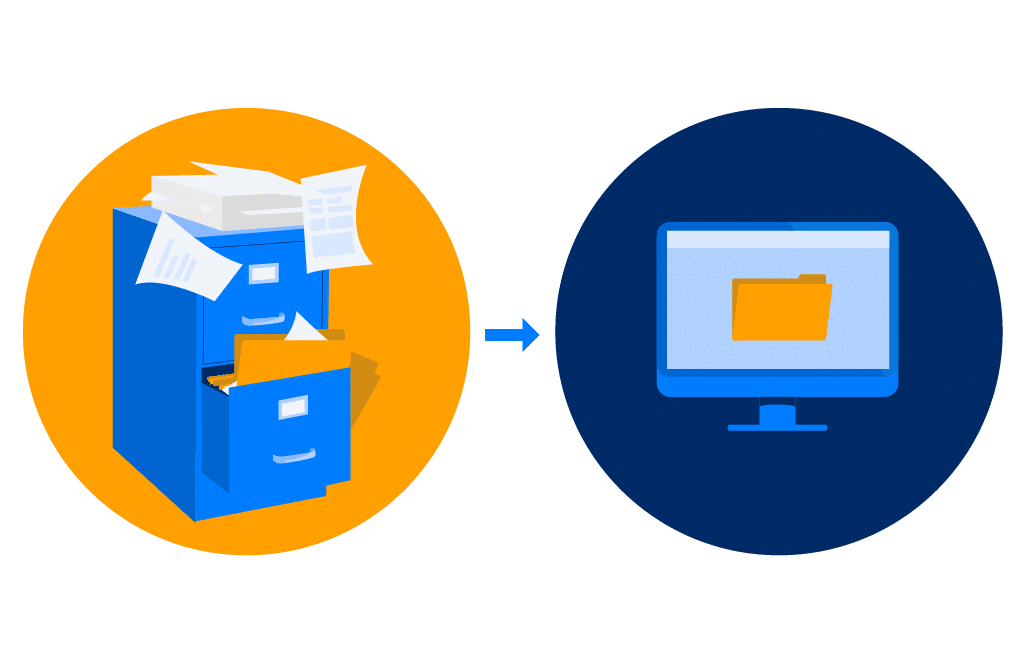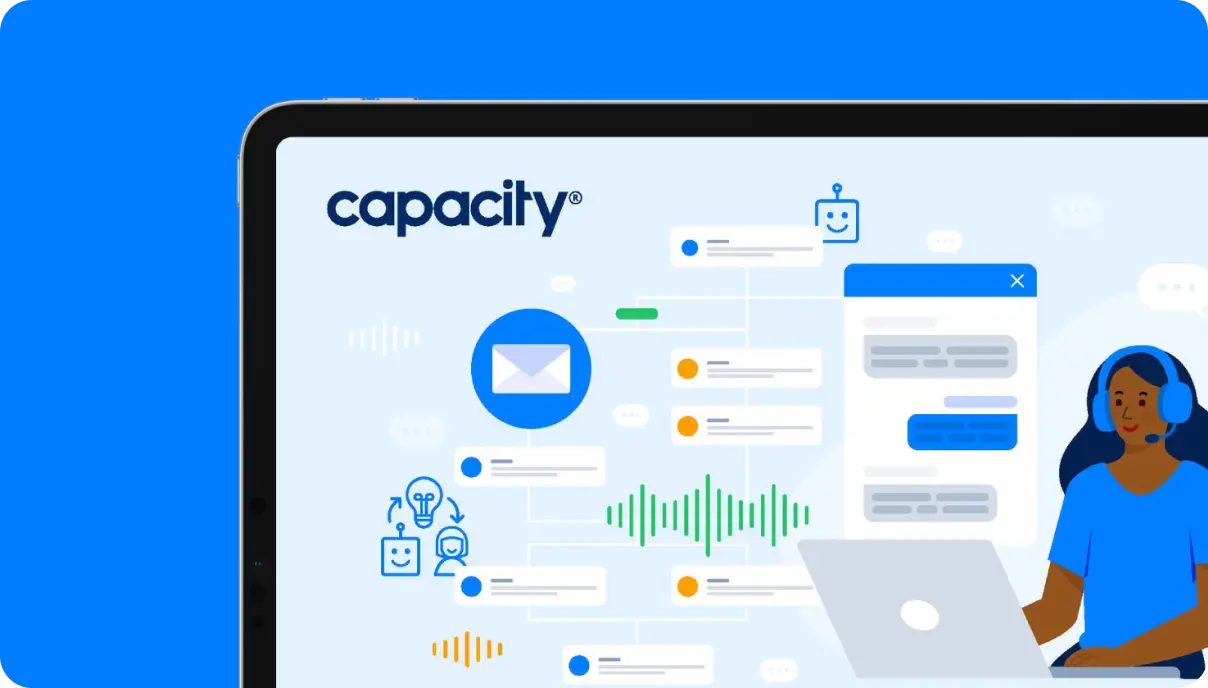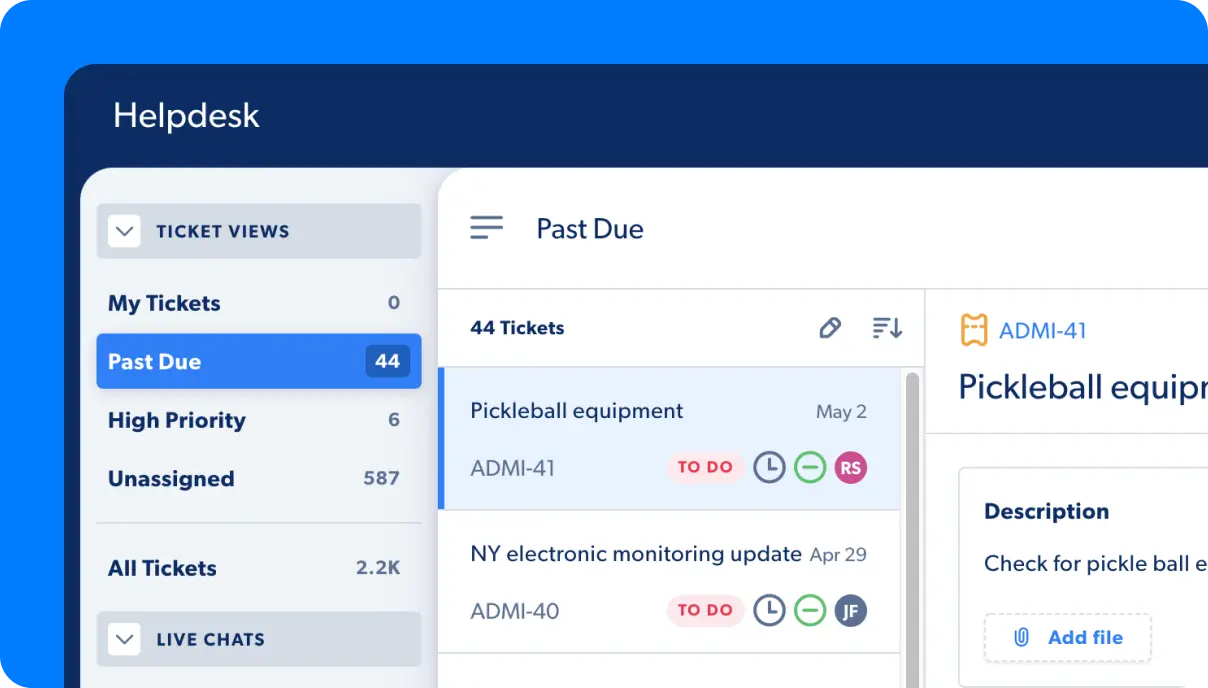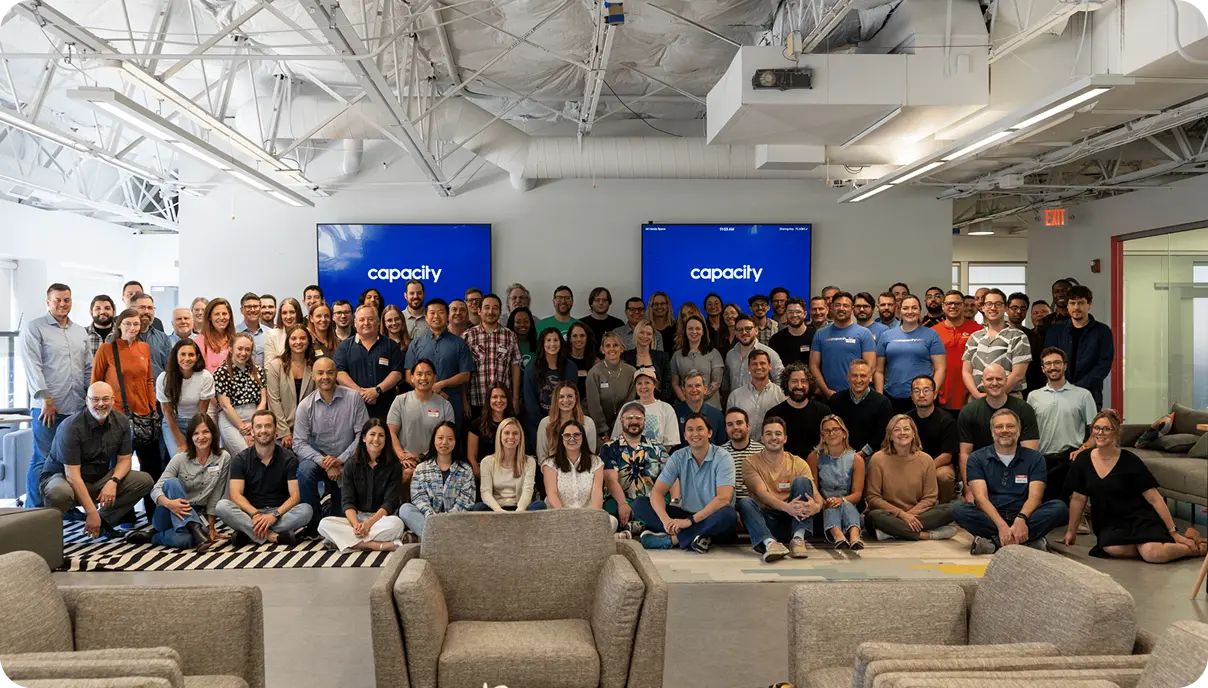As a business leader, you know how tedious and time-consuming HR tasks can be. From processing employee data to managing leave requests, the list continues. But what if there was a way to automate these mundane tasks and make HR more efficient? This is where Robotic Process Automation (RPA) comes in.

Streamline Complex Processes Instantly
Capacity’s AI and automation technology can help:
- Answer FAQs anytime, anywhere
- Find relevant documents within seconds
- Give surveys and collect feedback
What is Robotic Process Automation in HR?
RPA is the use of intelligent automation to automate repetitive, rule-based processes in HR. This technology uses software robots or “bots” to complete tasks typically performed by humans. These bots can be programmed to follow the rules and guidelines to complete tasks accurately and efficiently.
How to Use RPA to Streamline Tedious HR Tasks

So how can you use RPA to streamline tedious HR tasks? Here are some ways to get started:
1. Data Entry and Management
One of the most time-consuming tasks in HR is data entry and management. RPA can help automate this process by extracting data from different sources and inputting it into your HR system.
It can include employee data, performance reviews, and benefits information. By automating data entry and management, you can reduce errors and ensure that data is always up-to-date.
2. Leave Management
Leave management can be a headache for HR teams, especially when employees request time off in different formats.
With RPA, you can automate the entire process, from approving leave requests to updating employee calendars, so that HR teams can focus on more strategic tasks, such as employee engagement and retention.
3. Onboarding and Offboarding
Onboarding and offboarding employees can be a lengthy process that involves multiple departments. RPA can help automate these tasks by creating employee profiles, assigning access to systems and tools, and updating HR systems with new employee information.
This can help reduce the time and effort required to onboard and offboard employees while ensuring everything is done correctly and efficiently.
Top 4 Benefits of Robotic Process Automation in HR

Now that you know how RPA can help streamline HR tasks, let’s take a look at some of the top benefits of using this technology:
Increased Efficiency
By automating repetitive tasks, RPA can help HR teams work more efficiently. So, HR teams can focus on higher-value tasks, such as talent management and employee engagement. RPA can also reduce errors and ensure that data is always up-to-date.
Cost Savings
RPA can help HR teams save time and money by reducing the need for manual labor. HR teams can focus on strategic tasks like talent management and employee engagement. RPA can also reduce errors and ensure that data is always up-to-date.
Improved Compliance
RPA can help HR teams comply with all relevant regulations and standards, including GDPR, HIPAA, and other data protection laws. By automating compliance-related tasks, HR teams can reduce non-compliance risk and avoid costly fines.
Better Employee Experience
By automating tedious tasks, RPA can help improve the employee experience. This includes faster response times, more accurate data, and a more streamlined HR process. HR teams can create a more engaging and personalized employee experience by focusing on strategic tasks.
RPA HR use cases
Now that you know the benefits of using RPA in HR, let’s take a look at some common use cases:

Employee Self-Service
One of the most significant benefits of RPA in HR is the ability to create chatbots and other automation tools that allow employees to manage their HR tasks. For instance, employees can use chatbots to request time off, update their personal information, and access employee benefits without HR team intervention.
Support automation platforms like Capacity use RPA technology to empower employees to find their own answers, reducing shoulder taps. Take a look at how Capacity integrates within Slack to automate the PTO request process:

Recruitment and Hiring
RPA can help HR teams automate the recruitment and hiring process, from creating job postings to screening resumes and scheduling interviews. By using RPA, HR teams can identify top talent more quickly and efficiently, reducing the time spent on manual tasks.
Performance Management
Another area where RPA can be used in HR is performance management. HR teams can use RPA to automate performance management tasks, such as creating performance reviews and providing employee feedback. This approach ensures that performance reviews are completed on time and that feedback is delivered promptly and consistently.
Payroll Processing
RPA can also help automate payroll processing tasks, such as calculating employee salaries and benefits, processing tax payments, and generating payroll reports. By automating these tasks, HR teams can ensure that payroll is processed accurately and efficiently, reducing the risk of errors and delays.
Want to see more use cases? Check out our guide to everything HR automation, or learn how the Capacity HR team uses the Capacity platform internally!
Common Challenges HR Teams Face (and How RPA Can Help)

Here are some of HR teams’ most common challenges and how RPA can help overcome them:
Manual Data Entry
One of the biggest challenges facing HR teams is manual data entry. HR teams often manage vast amounts of employee data, including personal information, performance metrics, and benefits.
Manually entering this data can be time-consuming, tedious, and prone to errors, leading to inefficiencies and inaccuracies. RPA can help automate data entry tasks, ensuring that employee data is accurate, up-to-date, and readily accessible.
Time-Consuming HR Tasks
HR teams are also responsible for various time-consuming tasks, such as creating job postings, scheduling interviews, and managing employee benefits.
These tasks can be time-consuming and detract from more strategic HR activities. RPA can help automate these tasks, allowing HR teams to focus on more high-value activities, such as employee engagement and performance management.
Inconsistent Processes
HR teams often struggle with inconsistent processes and procedures, leading to errors, inefficiencies, and employee confusion.
RPA can help standardize HR processes, ensuring they are consistent and repeatable. This can help HR teams deliver a more consistent employee experience while reducing errors and streamlining operations.
Compliance Management
Another major challenge facing HR teams is compliance management. HR teams are responsible for ensuring that their organization complies with a range of local, state, and federal regulations, including employment, benefits, and data privacy laws.
Staying on top of these regulations can be a daunting task. Still, RPA can help automate compliance management tasks, ensuring that HR teams remain compliant while reducing the risk of errors and penalties.
HR teams face various challenges that can hinder their ability to perform their duties effectively. RPA allows HR teams to automate tedious tasks, streamline operations, and ensure a consistent employee experience.
5 Key Considerations for Choosing an RPA Solution for HR
As more and more HR teams adopt RPA to streamline their operations and improve the employee experience, choosing the right RPA solution for your organization’s unique needs is essential.

Here are some key considerations to keep in mind when selecting an RPA solution for HR:
Ease of Use
When selecting an RPA solution for HR, choosing an easy-to-use and maintain platform is essential. HR teams typically don’t have extensive coding or technical knowledge, so the RPA platform should be intuitive and user-friendly.
Look for a solution that offers a drag-and-drop interface, pre-built templates, and visual workflows to simplify the automation process.
Integration Capabilities
An RPA solution for HR should integrate seamlessly with your existing HR systems, such as your HRIS, applicant tracking system, and payroll software. Ensure the RPA platform offers robust integration capabilities, such as APIs and connectors, to ensure a seamless data flow between systems.
This will help ensure your HR processes are fully automated and all data is synced across systems.
Security and Compliance
Security and compliance are critical considerations when selecting an RPA solution for HR. To protect employee data, look for an RPA platform with robust security features, such as data encryption, access controls, and audit trails.
The platform should also comply with data privacy regulations like GDPR and CCPA to avoid potential legal and financial risks.
Scalability
Your organization’s HR needs will likely change, so choosing an RPA solution to scale your business is essential.
Look for a platform to handle a growing volume of HR processes and automate new processes as needed. The platform should also be flexible enough to accommodate changing HR processes and requirements.
Support and Training
Finally, when selecting an RPA solution for HR, choosing a vendor with robust support and training resources is essential. Look for a vendor offering comprehensive documentation, training materials, and customer support to help your HR team quickly get up to speed with the platform.
The vendor should also provide ongoing support to ensure that your HR team can maximize the benefits of RPA over time.

Streamline Complex Processes Instantly
Capacity’s AI and automation technology can help:
- Answer FAQs anytime, anywhere
- Find relevant documents within seconds
- Give surveys and collect feedback
Capacity – Best Robotic Process Automation in HR Solution
Capacity is an AI-powered support automation platform that offers a low-code solution to automate repetitive support tasks, streamline business processes, and answer frequently asked questions.
Its conversational AI interface enables graceful human handoffs and intuitive task management through a powerful workflow automation suite, developer platform, and flexible database that can be deployed anywhere. Capacity provides solutions like robotic process automation in HR so teams can prevent tickets and repetitive tasks.
Here are the key offerings of Capacity:
- All-in-one helpdesk to answer more than 90% of frequently asked questions and reduce the tickets in your support team’s queue.
- Low-code workflows to automate monotonous processes and tasks, increasing productivity in cross-functional teams.
- User-friendly knowledge base, app integrations, and conversational interface to empower employees with access to information and personalized experiences.
- Intuitive task management and powerful workflow automation suite to optimize and streamline processes.
- Develop a platform and flexible database deployed anywhere for seamless integration into your tech stack.
75% of executives plan to adopt a new support solution in the next 6 months. Are you ready to transform your business with automation solutions?
See why 1200+ companies choose Capacity to automate their tedious tasks. Try it for free today!













































